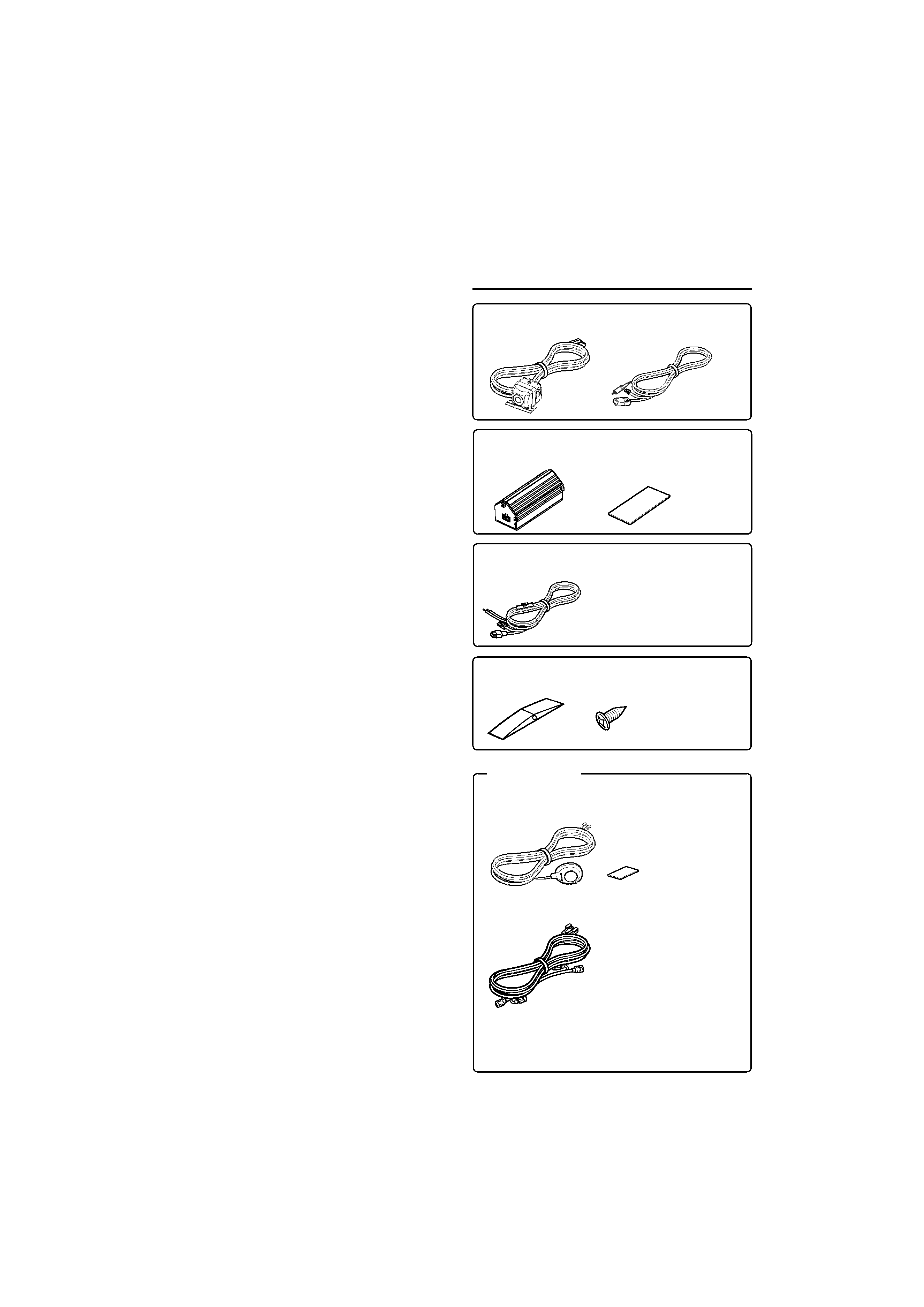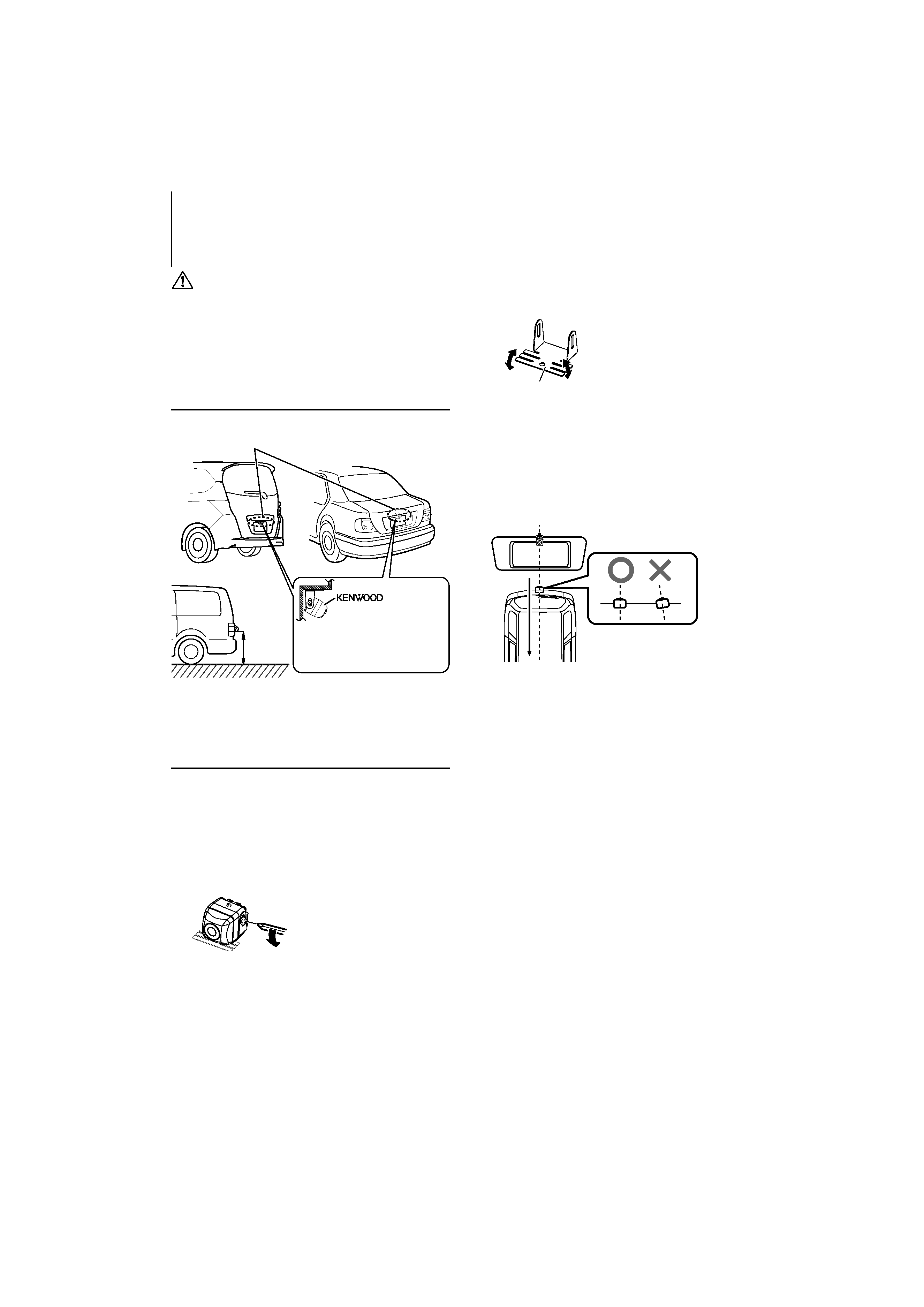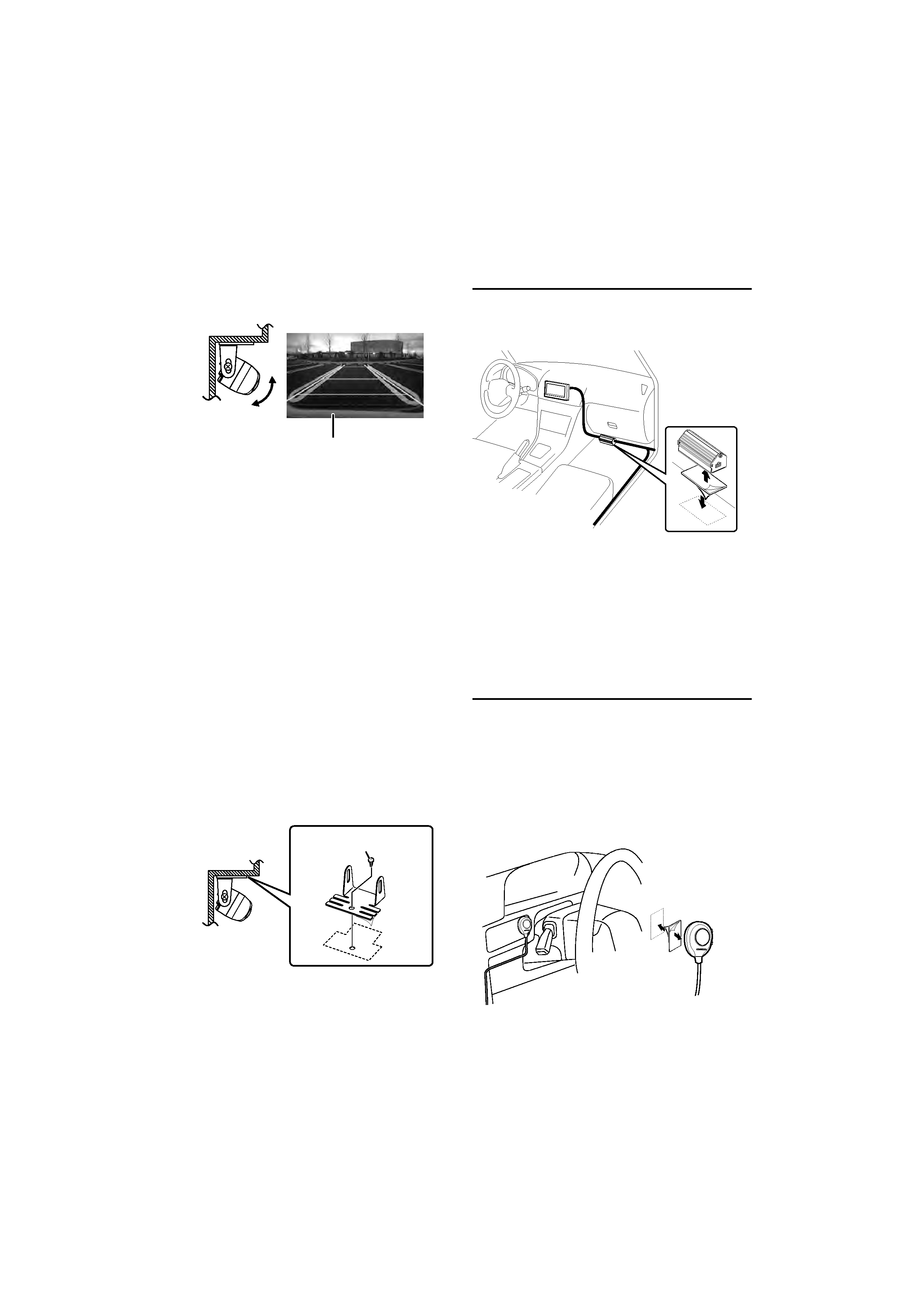
CMOS-300
CMOS-200
UNIVERSAL MULTI-VIEW CAMERA/ UNIVERSAL REAR VIEW CAMERA
INSTRUCTION MANUAL
CAMÉRA MULTI-VUES UNIVERSELLE/ CAMÉRA DE RECUL UNIVERSELLE
MODE D'EMPLOI
UNIVERSAL MULTIVIEW-KAMERA/ UNIVERSAL RÜCKFAHRKAMERA
BEDIENUNGSANLEITUNG
UNIVERSELE MULTIVIEWCAMERA/ UNIVERSELE ACHTERUITRIJCAMERA
GEBRUIKSAANWIJZING
TELECAMERA MULTIVISIONE UNIVERSALE/ TELECAMERA PER RETROMARCIA UNIVERSALE
ISTRUZIONI PER L'USO
CÁMARA DE MULTIVISIÓN UNIVERSAL/ CÁMARA DE VISTA TRASERA UNIVERSAL
MANUAL DE INSTRUCCIONES
CÂMARA MULTIVISÃO UNIVERSAL/ CÂMARA TRASEIRA UNIVERSAL
MANUAL DE INSTRUÇÕES
© B64-4756-18/01 (W)
Take the time to read through this instruction manual.
Familiarity with installation and operation procedures will help you obtain the best
performance from your new Universal Camera.
For your records
Record the serial number, found on the back of the unit, in the spaces designated on the
warranty card, and in the space provided below. Refer to the model and serial numbers
whenever you call upon your Kenwood dealer for information or service on the product.
Model CMOS-300/CMOS-200 Serial number
US Residence Only
Register Online
Register your Kenwood product at
w w w.Kenwoodusa.com
$AKPFD

2 | CMOS-300/CMOS-200
above because of the danger of malfunction due to high
temperatures.)
· Before drilling any mounting holes always check behind
where you want to drill the holes. Do not drill into the gas
line, brake line, electrical wiring or other important parts.
· If this unit is installed in the passenger compartment, anchor
it securely so it does not break free while the car is moving,
and cause injury or an accident.
· If this unit is installed under a front seat, make sure it does not
obstruct seat movement. Route all leads and cords carefully
around the sliding mechanism so they do not get caught or
pinched in the mechanism and cause a short circuit.
Care and maintenance
· When the product gets dirty, wipe dry with a silicon cloth or
soft cloth. If it is seriously stained, remove stain with a cloth
moistened with a neutral cleaner and then wipe the cleaner
away. Do not use a hard cloth and/or a volatile substance
such as lacquer thinner or alcohol, scratches, deformation,
degradation and/or damage may result.
· When a lens component gets dirty, wipe gently with a soft
clock moistened with water. Do not rub with a dry cloth to
prevent scratching the lens.
Installation Procedure
1 To prevent a short circuit, remove the key from the
ignition and disconnect the
- battery.
2 Make the proper input and output wire connections
for each unit.
3 Connect the wiring harness wires in the following
order: ground, ignition, reverse and camera unit.
4 Connect the wiring harness connector to the power
supply box unit.
5 Install the unit in your car.
6 Reconnect the
- battery.
2WARNING
· If you connect the ignition wire (Red) to the car chassis
(Ground), you may cause a short circuit, that in turn may
start a fire. Always connect those wires to the power source
running through the fuse box.
· Do not cut out the fuse from the ignition wire (Red). The
power supply must be connected to the wires via the fuse.
2CAUTION
· If your car's ignition does not have an ACC position, connect
the ignition wires to a power source that can be turned on
and off with the ignition key. If you connect the ignition wire
to a power source with a constant voltage supply, as with
battery wires, the battery may die.
· If the fuse blows, first make sure the wires aren't touching to
cause a short circuit, then replace the old fuse with one with
the same rating.
2WARNING
To prevent injury or fire, take the following
precautions:
· To prevent a short circuit, never put or leave any metallic
objects (such as coins or metal tools) inside the unit.
· Installation and wiring of this product require specialist
skill and experience. To assure your safety, please request a
specialist technician to install the unit.
2CAUTION
To prevent damage to the product, take the
following precautions:
· Make sure to ground the unit to a negative 12V DC power
supply.
· When replacing a fuse, only use a new fuse with the
prescribed rating. Using a fuse with the wrong rating may
cause your unit to malfunction.
· Do not use your own screws. Use only the screws provided. If
you use the wrong screws, you could damage the unit.
NOTE
· This product is a rear view camera for checking the view at
the rear of a car.
· A rear view camera is a camera that provides symmetrical
images in the same way as rear and side view mirrors.
· Connection to a TV with an RCA video input is possible,
but confirm whether the TV you use has a reverse gear
connection function.
· This product is designed to supplement the driver's rear
view, but the camera images do not show all dangers and
obstacles. Be sure to look behind you when reversing to
confirm the view.
· This product features a wide-angle lens, so the near view
is wide and the far view is narrow, which may create a false
sense of distance. Be sure to look behind you when reversing
to confirm the view.
· Do not wash your car with an automatic car wash or high-
pressure water as it may result in water entering the camera
or the camera falling off.
· Check camera bracket installation before driving.
Are the screws loose?
- Is the camera bracket firmly secured?
- If the rear view camera comes loose while you are driving it
may cause an accident.
· Before finally installing the unit, connect the wiring
temporarily, making sure it is all connected up properly, and
the unit and the system work.
· When mounting this unit, make sure none of the leads are
trapped between this unit and the surrounding metalwork or
fittings.
· Do not mount this unit near the heater outlet, where it would
be affected by heat, or near the doors, where rainwater
might splash onto it. (Never install in locations such as the
Before Use/ Installation Procedure
$AKPFD

English
|
3
· Insulate unconnected wires with vinyl tape or other similar
material. To prevent a short circuit, do not remove the caps
on the ends of the unconnected wires or the terminals.
· After the unit is installed, check whether the brake lamps,
blinkers, wipers, etc. on the car are working properly.
· Install so that it does not obstruct the rear field of view.
· Install so that it does not protrude from the side of the car.
· Do not perform installation in rain or fog.
· When humidity is high, dry the surface to which the unit is to
be attached before installing.
· Moisture on the attachment surface reduces adhesive
strength, which may lead to the unit coming off.
· Do not attach the camera bracket to areas on the car body
treated with fluorocarbon resin, or glass.
· May result in the rear view camera falling off.
- Do not apply water to the unit.
- Do not expose the unit to rain.
- Do not subject the camera to unnecessary force.
- Thoroughly clean where tape is used for sticking on the
unit.
· Refer to the Instruction's manual for details on connecting
the other units, then make connections correctly.
· Secure the wiring with cable clamps or adhesive tape. To
protect the wiring, wrap adhesive tape around them where
they lie against metal parts.
· Route and secure all wiring so it cannot touch any moving
parts, such as the gear shift, handbrake and seat rails.
· Do not route wiring in places that get hot, such as near the
heater outlet. If the insulation of the wiring melts or gets torn,
there is a danger of the wiring short-circuiting to the vehicle
body.
· When replacing the fuse, be sure to use only fuse of the
rating prescribed on the fuse holder.
· To minimize noise locate the TV antenna cable, radio antenna
cable and RCA cable as far away from each other as possible.
· Do not install the power supply box unit in places where it
may become subject to high temperatures or humidity, such
as:
- Places close to a heater, vent or air conditioner.
- Places exposed to direct sunlight, such as on top of the
dashboard or the rear shelf.
- Places that may be splashed by rain, for example close to
the door.
· Lay the cords by avoiding high-temperature areas. Use
corrugated tubes for wiring inside the engine room. If a cord
contacts a high-temperature area of the vehicle, the coating
may melt and cause short-circuiting, which may lead to a fire
or electric shock hazard.
Accessories
Camera (with camera bracket) ..........1
Camera connection cord ..........1
Power supply box..........1
Double-side adhesive tape (Large)..........1
Power cord ..........1
Switch unit..........1
Double-side adhesive tape (Small) ..........1
CMOS-300 only
The head unit connection cord is used for connection to
a Kenwood car navigation system equipped etc. with the
camera control function.
Waterproof packing ..........1
Camera bracket clamping screw..........1
Head unit connection cord ..........1
$AKPFD

4 | CMOS-300/CMOS-200
CAUTION
· The adjustments during camera setting may be
hindered depending on the camera installation
position. Do not install the camera securely but
attach it only temporarily until the camera setting has
completed.
Recommended Installation Position
Examples of correct camera installation
Installation position
The CMOS-300 should be installed at a
height of 55 cm (21.7 inch) or more.
Mount so that the
"KENWOOD" logo appears at
the top.
Installing the Camera/Adjusting its
angle
1 Decide the camera installation position.
2 Clean the camera installation surface.
Using a commercially available cleaner, wipe dirt,
moisture and oil away from the surface on which
the camera bracket is to be attached.
3 Loosen the camera bracket retaining screws.
Using a commercially
available Phillips
screwdriver, loosen the two
retaining screws.
Perform steps 4 and 5 only when they are required.
4 If required, separate the camera bracket from
the camera and adjust the shape according to
the surface on which it will be attached.
Bend
Bend
Camera bracket
Adjust the camera
bracket shape so
that it fits the camera
installation position.
5 Mount the camera on the camera bracket.
Mount so that the "KENWOOD" logo appears at the
top.
6 Fix the camera temporarily with tape, etc.
Using a piece of tape, etc., fix the camera
temporarily and adjust the angles so that the rear
end of the vehicle can be viewed.
12-34
Attach the camera on the rear center position of
the vehicle taking care not to hide the license plate.
Make sure that the camera points straight toward
the rear of the vehicle travel direction. Be careful
not to lean the camera toward other directions of
the vehicle, etc.
7 Complete all of the required connections.
8 Display the camera video.
Some video monitors may switch automatically to
the external video input function. For details, read
the instruction manual for your video monitor.
9 Change the shift lever to the R (Reverse) range
to view the image of the rear of the vehicle.
Before viewing the camera, apply the parking brake
and chock the wheels so that the vehicle will not
move. Otherwise, an unexpected accident may
result.
Installation
$AKPFD

English
|
5
Installing the Power Supply Box
1 Attach double-side adhesive tape on the power
supply box and then attach it under the carpet
on the front passenger seat side.
Do not attach the power supply box in the
following place.
- Place moistened by water.
- Unstable surface.
- Place that comes in the way of driving.
- Under high temperature.
Installing the Switch Unit (CMOS-300
only)
1 Clean the switch unit installation surface.
Using a commercially available cleaner, wipe dirt,
moisture and oil away from the surface on which
the switch unit is to be attached.
2 Attach double-side adhesive tape on the
bottom of the switch unit and then attach it in
an easy-to-operate position, for example near
the dashboard on the driver seat side.
10 Adjust the camera angle so that the rear part of
the vehicle or the rear bumper is visible at the
bottom of the monitor screen.
Vehicle rear part or bumper
When adjusting the camera angle, be careful not to
stretch the camera cord.
11 After adjusting the camera angle, tighten the
retaining screws firmly.
Inspect the retaining screws at times. If they are
loose, tighten them firmly.
12 Perform the operations in "Camera Setting"
(page 8). (CMOS-300 only)
If an adjustment is not possible in the currently
available range, change the camera position before
retrying.
13 Fix the camera firmly in position.
Peel off the paper liner from the double-side
adhesive tape on the camera bracket and attach it.
After attaching, push the camera bracket with your
finger to ensure close adhesion.
Do not touch the adhesive surface with your hand
or peel and reattach an attached tape, as these
will degrade the adhesive force and may cause the
camera bracket to be detached. If required, secure
the bracket on the vehicle body using the camera
bracket clamping screw.
Camera bracket clamping screw
$AKPFD
